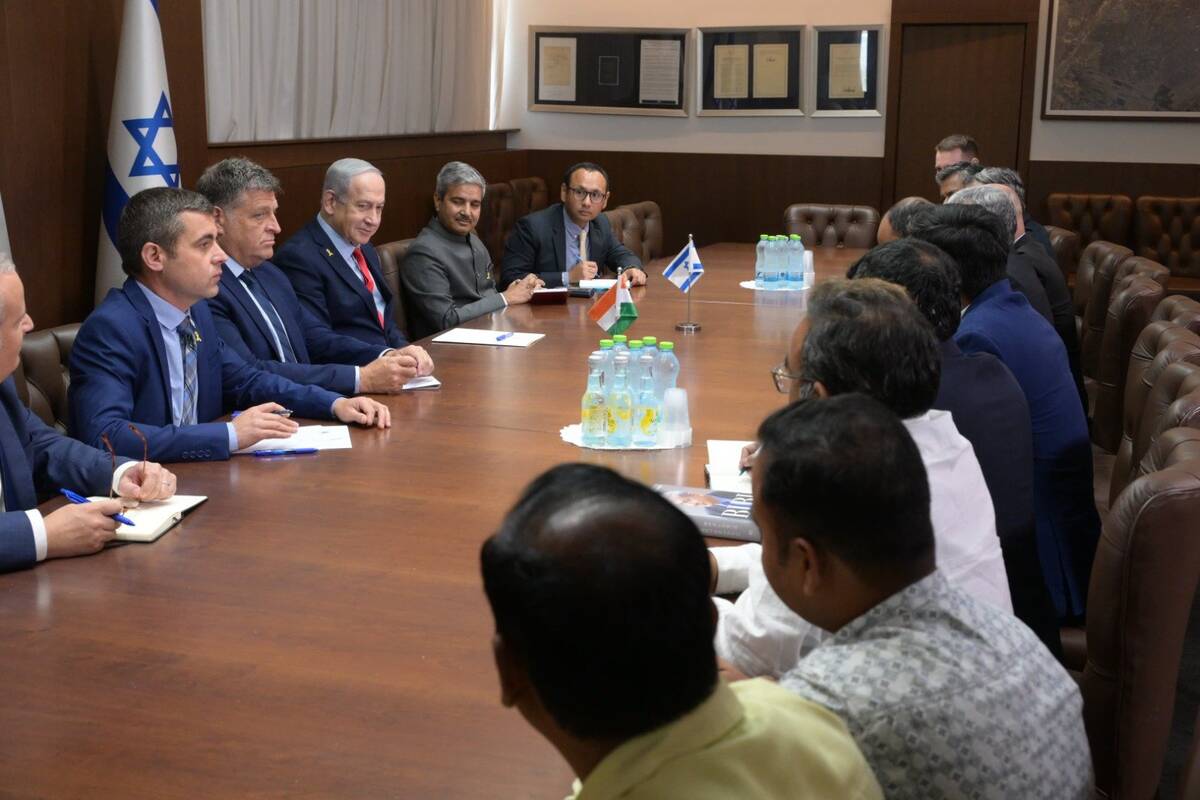ISLAMABAD: Prime Minister Benjamin Netanyahu has acknowledged IndiaŌĆÖs use of ŌĆ£battle-testedŌĆØ Israeli weapons in a recent conflict with Pakistan and said all of them had ŌĆ£worked well,ŌĆØ Indian media reported this week.
India and Pakistan engaged in a four-day military standoff, sparked by a militant attack in Indian-administered Kashmir, leaving nearly 70 people dead on both sides before agreeing to a United States-brokered ceasefire on May 10.
The conflict, the worst between the neighbors in over two decades, saw the use of Chinese-made beyond-visual-range (BVR) missiles, French-made Rafale jets, Israeli and Turkish drones and sophisticated air and ground warfare technologies.
Speaking to Indian journalists in Jerusalem on Thursday, Netanyahu said the military equipment supplied to India by Israel had performed well during ŌĆśOperation SindoorŌĆÖ against Pakistan and that defense ties between New Delhi and Tel Aviv were on an upswing, The Telegraph newspaper, published in India, reported.
ŌĆ£Israel supplied military equipment to India before [Operation Sindoor]. All of them worked well. Israeli equipment used during Operation Sindoor were battle proven,ŌĆØ Netanyahu was quoted as saying.
ŌĆ£We donŌĆÖt develop them in labs, but in battlefield. So they are battle-tested. We have a robust defense cooperation. It is on a pretty solid foundation.ŌĆØ
Netanyahu met Indian journalists after his meeting with IndiaŌĆÖs ambassador to Israel, J P Singh, the Israeli PMŌĆÖs office said.

Israeli Prime Minister Banjamin Netanyahu shakes hands with Indian Ambassador to Israel J.P. Singh in Jerusalem on August 7, 2025. (Handout/X/@IsraeliPM)
ŌĆ£The Prime Minister and the Ambassador discussed the expansion of bilateral cooperation, especially on security and economic issues,ŌĆØ it said in a statement. ŌĆ£Prime Minister Netanyahu then met with senior Indian journalists and answered their questions.ŌĆØ
The four-day India-Pakistan clash marked the first time New Delhi and Islamabad utilized unmanned aerial vehicles (UAVs) at scale against each other.
The Indian military used Barak missiles, jointly developed with Israel, and Tel AvivŌĆÖs HARPY drones, in addition an impressive array of domestically manufactured weapons systems, to repel waves of Pakistan missiles over the 96-hour conflict, according to the Times of India newspaper.

Israeli Prime Minister Banjamin Netanyahu (4L) meets a delegation of Indian journalists during a meeting with New DelhiŌĆÖs envoy J.P. Singh in Jerusalem on August 7, 2025. (Handout/X/@IsraeliPM)
ŌĆ£Israel is among IndiaŌĆÖs largest supplier of weapons and weapons systems,ŌĆØ the read said. ŌĆ£India has imported military hardware worth $2.9 billion from Israel over the last decade, including radars, drones, and missiles. Tel Aviv has ensured a steady supply of weapons to Delhi.ŌĆØ
On May 7, Pakistan and India fought in the air with some 110 aircraft involved, experts estimate, making it the worldŌĆÖs largest air battle in decades.
Pakistan declared a victory in the standoff, saying its air force used Chinese J-10C aircraft to shoot down six Indian fighter jets, including three French Rafales, and the army targeted several Indian military installations during the recent flare-up. While Indian officials have acknowledged losses, they have not specified the number of jets downed by Pakistan.
The hour-long fight, which took place in darkness, offered the world a first real glimpse into how advanced Chinese military technology performs against proven Western hardware, with Chinese defense stocks surging in its wake.
Over the past five years, China has supplied 81 percent of PakistanŌĆÖs imported weapons, according to data from the Stockholm International Peace Research Institute (SIPRI). Those exports include advanced fighter jets, missiles, radars and air-defense systems.

Israeli Prime Minister Banjamin Netanyahu meets a delegation of Indian journalists during a meeting with New DelhiŌĆÖs envoy J.P. Singh in Jerusalem on August 7, 2025. (Handout/X/@IsraeliPM)
Some Pakistan-made weapons have also been co-developed with Chinese firms or built with Chinese technology and expertise. Beijing is also investing over $60 billion to build infrastructure, energy and other projects in Pakistan as part of its China-Pakistan Economic Corridor.
India was planning to invest heavily in local industry and could spend as much as $470 million on UAVs over the next 12 to 24 months, roughly three times pre-conflict levels, Smit Shah of Drone Federation India, which represents over 550 companies and regularly interacts with the government, was quoted as saying by Reuters.
Netanyahu noted that Israel had developed ŌĆ£advanced technologiesŌĆØ and mentioned ongoing cooperation with India during his meeting with Indian journalists, WION, an English-language Indian news channel, reported on Friday.
ŌĆ£Israel was keen to finalize mutual defense and economic agreements with India at the earliest,ŌĆØ he was quoted as saying.
















